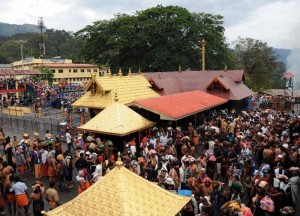Temples turn richer with ‘sin’ currencies after Nov 8….reports India Daily Newsdesk

Demonetisation has made India’s temples significantly richer as hundi deposits have seen an upsurge with “sin” currencies after November 8 when the government spiked 500- and 1,000-rupee notes.
These notes are still being put into the hundis, or donation boxes, as only a few of these temples are strictly discouraging or prohibiting people from offering them.
Hundi deposits, which are anonymous donations, have increased over the last fortnight even though religious places per se have not been provided an exemption to accept the old notes.
But Finance Ministry officials told IANS that the cash deposited by temples from the hundis will not come under the tax scanner. “For temples, there is an exemption that if the money is from the donation boxes, we will not ask questions. There is no limit on that (deposits),” an official told IANS.
The charitable trusts that maintain the temples will, however, have to keep proper records of devotees directly giving them donations.
An official of the richest temple of the country, Tirumala Tirupati Devasthanam (TTD) in Andhra Pradesh, told IANS that TTD was “depositing these (old) notes in banks as the government has already clarified that the cash deposited from offerings made by devotees at temples will not be taxed”.
Temple officials had, before demonetisation, told IANS that the hundi collection this fiscal is expected to be around Rs 1,000 crore ($146 million) out of the total revenue of Rs 2,600 crore. This target may be crossed following demonetisation.
The famed Durga temple of Vijayawada has seen its hundi donations increase by over Rs 1 crore after demonetisation.
According to its managing committee, the temple has received Rs 2.89 crore in the current month so far, which is already Rs 1 crore higher than the usual collection. “These include 2,941 Rs 1,000 notes and 15,723 Rs 500 notes. The devotees also dropped 48 new notes of Rs 2,000 in the hundis.”
The TTD temple in Chennai also witnessed a sudden spike in hundi offerings. An official said the normal hundi collection is around Rs 1 crore per month, but post-demonetisation the collections have spiked to over Rs 2 crore with several bundles of 500 and 1,000 rupee notes being found in the donation boxes.
The temple has not put up any notice asking the public not to offer the demonetised currencies.
At the Palani Murugan Temple in Tamil Nadu an official told IANS that the hundi collections will be deposited in the bank and demonetisation was not an issue.
There are some major temples which have prohibited devotees from putting the old currency notes into the donation boxes.
V.N. Das, National Communication Director, Iskcon, told IANS: “We are a charitable trust. For documented donations we are obviously not taking old notes. And we are not allowing anyone to put the old notes in the drop boxes. It is being strictly followed. After November 8, we have already opened the donation boxes and deposited whatever old notes were there.”
The Shiromani Gurdwara Parbandhak Committee (SGPC), which manages gurdwaras in Punjab, including the Golden Temple, stopped accepting the 500 and 1,000 currency notes from November 10.
“We have directed all gurdwara managemnents, including those in-charge of Harmandir Sahib (the Golden Temple), not to accept old notes of Rs 500 and 1000 denominations. Some devotees are still putting the old currency notes in the golaks (currency chests). The sewadars (religious volunteers) are discouraging people from putting the old currency,” an official of the Amritsar-based SGPC told IANS.
Speaking to IANS, Prayar Gopalakrishnan, President of the Travancore Devasom Board (TDB), which looks after 1,250 temples, said the board has a problem on account of the new directives.
“Sabarimala is the biggest temple and the temple receipts in the two-month-long pilgrimage season that began last week is going to be a problem for us. I have written to Prime Minister Narendra Modi and to the Reserve Bank of India Governor. We have a schedule to open the hundi collection boxes and that cannot be changed,” Gopalakrishnan said.
“Moreover, our festival season ends towards the third week of January. So we have to be given an extension in time to remit the spiked currencies,” he said, adding that the religious sentiments of the people who offer the money to the temple have to be taken into consideration.
At the Lord Ayyappa temple, officials said the hundi collection and money earned through sale of temple offerings shot up by Rs 2 crore in a week’s time as compared to the same period in the previous year.
“The total collection was over Rs 22 crore,” TDB member Ajay Tharayil told IANS









